Indigestion & Acid Reflux in Cats: Signs, Causes, & Treatment (Vet Answer)

Updated on

Click to Skip Ahead
Indigestion and acid reflux are fairly common problems encountered by cats. They can occur at any age, however, it is usually younger cats that are affected. There are many different causes of the condition, and the treatment options will depend on how the problem arose in the first place.
This article will discuss in-depth signs, causes, and treatment options for cats with indigestion and acid reflux and help you navigate through a tricky condition with your cat.
What are Indigestion and Acid Reflux?
Acid reflux occurs when there is an uncontrolled regurgitation of the contents of the stomach into the esophagus. This causes inflammation of the esophagus due to the acidic contents of the stomach fluid. Acid reflux can occur for many different reasons.
In a healthy cat, there is a functioning sphincter at the top of the stomach which closes to prevent the reflux of the stomach contents. This sphincter can sometimes get overwhelmed, and this is when acid reflux can occur.
It is a painful and uncomfortable condition that can be acute or chronic. If it is a chronic issue, over time, the esophagus becomes severely inflamed and very sore. Ulceration can occur which is extremely painful. The smooth muscle layer of the esophagus can eventually become scarred and constricted. This narrows the diameter of the esophagus causing a stricture, which affects your cat’s ability to consume food 1.
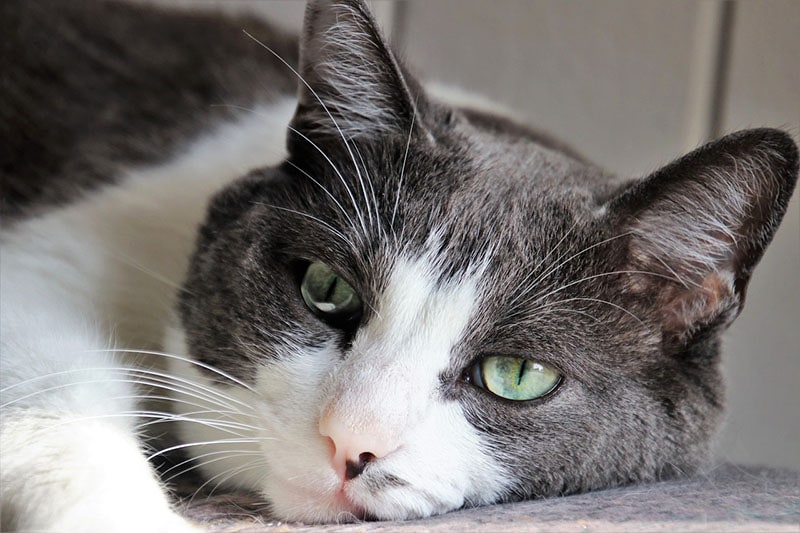
What are the Signs of Indigestion and Acid Reflux?
Indigestion and acid reflux are often difficult to diagnose as the signs can be very subtle, to begin with. Once signs do start to show, they are often very generalized and non-specific, so it can be hard to pinpoint exactly what is causing the signs 2.
- Pain around neck/throat area
- Spitting up/regurgitation
- Difficulty swallowing
- Excessive drooling
- Excessive yowling
- Changes in meow
- Trouble sleeping
- Loss of appetite/reluctance to eat
- Weight loss
- Vomiting
- Chronic cough
- Chronic nasal discharge
- Behavioral changes
If you see any of these signs, or you are concerned about your cat’s behavior, contact your vet.
If diagnosed early there are measures that you can take to ease the discomfort for your cat and prevent long-term damage from occurring. If chronic acid reflux is left untreated, severe irreversible damage may occur to the deep layers of the esophagus. This can include esophagitis, ulceration, and a reduction in the diameter of the esophagus .
Regular checkups with your vet mean subtle signs may be picked up earlier to prevent the progression of the disease.
What Are the Causes of Indigestion and Acid Reflux?
There are many different causes of indigestion and acid reflux. The more common ones are listed below:
- General Anesthesia. When a cat is placed under general anesthetic, this can cause the gastroesophageal sphincter to relax, allowing the contents of the stomach to reflux into the esophagus. This can also occur under anesthetic if the cat has not been fasted prior to the surgery. If the cat is placed incorrectly on the operating table, this can also cause stomach contents to travel back up to the esophagus.
- Hiatal Hernia. This is a condition seen in cats which is thought to increase the occurrence of acid reflux 3. It happens when the stomach and/or intestines push through a hole in the diaphragm into the chest cavity. It can be congenital, meaning it has resulted from a genetic defect and is present from birth. It can also be caused by a traumatic injury.
- Chronic Vomiting. Cats that have issues with chronic vomiting often suffer from acid reflux and indigestion. Causes of chronic vomiting can include inflammatory bowel conditions or foreign bodies causing an obstruction.
- Hairballs that have not been brought up fully by the cat can get stuck and retching/coughing can cause increased reflux.
- Dietary Indiscretion. Cats that eat non-cat food items frequently, scavenge from bins, or have a diet that constantly changes are more prone to acid reflux and indigestion. Cats that are fed a complete and balanced diet consistently are less likely to experience signs.
- There are some drugs that can either be included in a general anesthetic protocol or used alone that cause the esophageal sphincter to relax. These include acepromazine and atropine.
- Different types of cancer can cause or exacerbate acid reflux and indigestion. Some cause blockages in the gastrointestinal tract or put pressure on certain areas causing stomach contents to reflux.
In a lot of cases, the cause may simply be an upset stomach which will resolve on its own or can easily be treated with a short course of treatment. If a long-term issue is present, further investigations may be necessary.
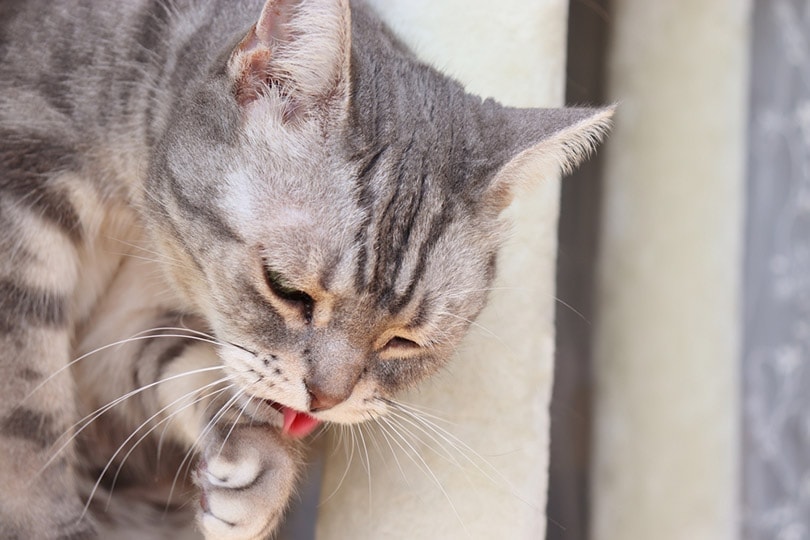
How are Indigestion and Acid Reflux Diagnosed?
Your veterinarian will take a thorough history from you detailing all clinical signs noted and the duration of these too. After this, they will be able to decide which diagnostic tests need to be carried out.
- Full blood test. A comprehensive blood test will be taken including a complete blood count and biochemistry profile. This will help assess blood cell counts, organ function, levels of enzymes and electrolytes.
- This is run to check for any infection, screen for metabolic illnesses, and to check kidney function.
- X-rays of the chest and abdomen. These can be taken under general anesthetic to assess the internal structure, to ensure the organs are positioned correctly, and no abnormalities are present.
- This is a type of technique used when X-rays are being taken that allows assessment of the esophagus in motion by highlighting it with a dye.
- Endoscopy. This is a fiber optic camera that can be put down into the esophagus to assess for any damage or disease, it can also be used to guide the retrieval of foreign bodies.
How Do I Care for a Cat with Indigestion and Acid Reflux?
Mild cases of acid reflux may be self-limiting but if the problem is chronic, medication or surgery may be required. The main aim of the treatment is to address the underlying cause.
- Dietary changes. Some of the problems that come with ingestion and acid reflux can be combated by a change in diet. Your vet will usually recommend low-protein foods and feeding little and often. This is thought to allow the gastroesophageal sphincter to strengthen while reducing the amount of acid in the stomach. This is because protein stimulates the secretion of gastric acid.
- Drugs that reduce stomach acidity. Some drugs are able to reduce the acidity of the gastric fluids, these include omeprazole and famotidine.
- Drugs that improve sphincter muscle. Certain drugs are available that increase the muscle tone of the gastroesophageal sphincter and increase the rate the stomach empties. These include cisapride and metoclopramide.
- Drugs that protect the lining of the esophagus. Some drugs work by protecting the mucosal lining of the esophagus. A commonly used example is sucralfate.
- Pain relief. As it is an uncomfortable and often painful condition, pain relief medication may be necessary. This must be chosen carefully so as not to aggravate any underlying disease processes.
- Antibiotic therapy. Antibiotics are sometimes indicated if severe inflammation has occurred and secondary bacterial infections may develop.
- Endoscopic retrieval of foreign body. If there is a foreign body present, it is possible to remove some foreign bodies using endoscopy. This requires a general anesthetic. If it is not possible to remove the foreign body this way, or if the foreign body has caused a perforation, surgery is usually indicated.
- Surgical intervention. Some cases may require surgical intervention, such as the repair of a hiatal hernia. There is a good prognosis if the problem has been identified early, however not so good if it has been unidentified for some time as there are risks of structure formation.
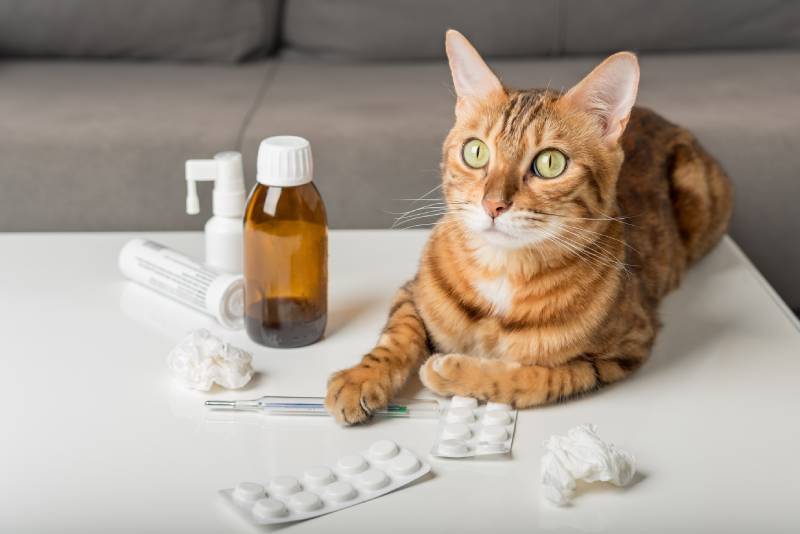
Frequently Asked Questions
At what age do cats suffer from indigestion and acid reflux?
Cats can suffer from acid reflux at any age. This does largely depend on the underlying cause. Conditions such as a hiatal hernia can be present at birth and may cause clinical signs such as indigestion and acid reflux from an early age. Other causes, such as chronic vomiting may occur at any stage in your cat’s life.
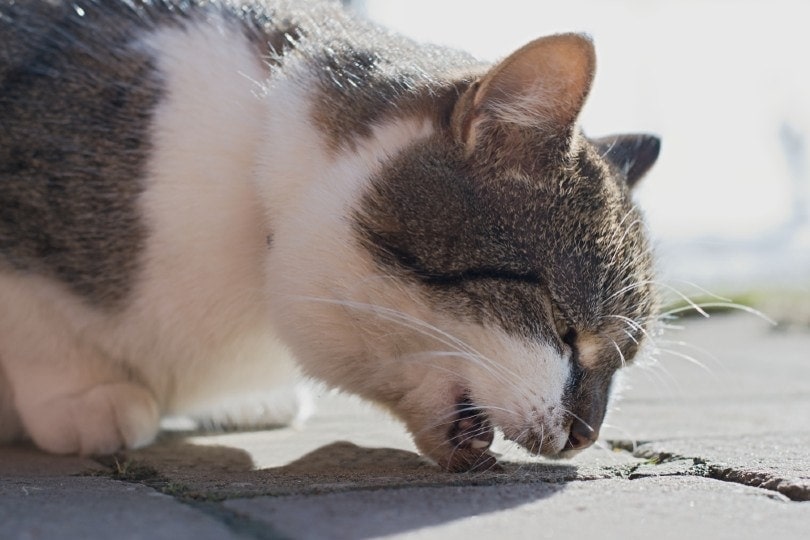
What are the symptoms of esophagitis in cats?
Esophagitis refers to inflammation of the esophagus, which is usually an effect of chronic acid reflux and indigestion. There may be no signs, to begin with, if only mild inflammation has occurred. However, if it is a chronic issue, it can be debilitating for your cat. Signs include excessive drooling, regurgitation, pain around the throat/neck area, reduced appetite, difficulty swallowing, and extension of the head and neck.
Are indigestion and acid reflux painful for cats?
Indigestion and acid reflux can be very painful and uncomfortable for cats. In the early stages, if it occurs infrequently, there may be no symptoms at all or only mild discomfort. However, if the disease has progressed then there will be substantial pain experienced, especially if ulceration is present in the esophagus.
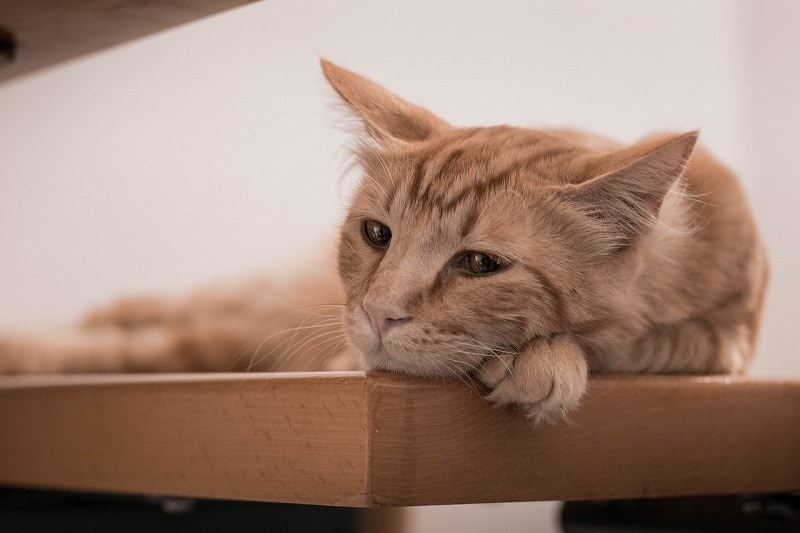
Final Thoughts
Indigestion and acid reflux in cats are common issues. In mild cases, there may be no signs at all or only subtle signs that are easily missed. This means that often the condition is only usually diagnosed when chronic acid reflux has caused damage to your cat’s body.
Indigestion and acid reflux can be a painful and debilitating condition, however, there are many different treatment options for your cat. The underlying cause of the reflux will enable your vet to choose the most appropriate and effective therapy and care.
Featured Image Credit: Sisacorn, Shutterstock












